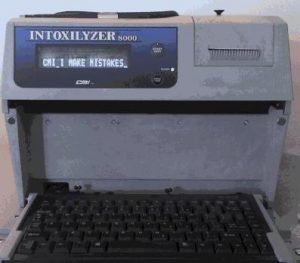Defen se attorneys and forensic experts have claimed for years breath-testing machines are unreliable. Those claims tend to fall on deaf ears due to the inherent bias of the source: defense attorneys are advocates for clients accused of crimes based on the results of the machines. Recently, however, more objective sources investigated the reliability of alcohol breath testers and concluded they are often unreliable.
se attorneys and forensic experts have claimed for years breath-testing machines are unreliable. Those claims tend to fall on deaf ears due to the inherent bias of the source: defense attorneys are advocates for clients accused of crimes based on the results of the machines. Recently, however, more objective sources investigated the reliability of alcohol breath testers and concluded they are often unreliable.
The Investigative Report
The objective sources are Stacy Cowley and Jessica Silver Greenberg. They are newspaper reporters who investigated breath-testing for an article in the New York Times. They interviewed more than 100 people for the investigation, including scientists, police officers, lawyers and executives. They also reviewed tens of thousands of pages of documents, such as court records, corporate filings and contracts.
The investigation revealed some interesting facts. For example, in the past 12 months, more than 30,000 breath tests were thrown out. The investigation cited many defects with breath testing, including programming mistakes in software, improper calibration, and human error. What I found especially interesting was the investigation uncovered problems with portable breath-testers, evidential breath-testing devices, and one particular device which has created controversy in Ohio.
Problems In Portable Breath-Testing Machines
The Times article discussed the use of portable breath testing machines (PBTs). Those are hand-held devices used during a roadside DUI/OVI investigation. They use fuel cells which react with alcohol to generate an electric current. The problem is the fuel cells react with chemicals other than alcohol to create the electric current. The consequence is the test results may be falsely elevated by a variety of substances. For this reason, Ohio does not permit the results of PBTs to be used in a person’s trial. Ohio does permit officers to use PBTs to aid the officer in deciding whether to arrest a person. They shouldn’t be used for any reason.
Errors In Evidentiary Breath-Testing Machines
The larger, stationary, breath-testing machines are often referred to as ‘evidentiary’ breath-testing instruments because their results are used in court. Although they use a different technology, infrared spectrometry rather than a fuel cell, they are not without flaws. Some problems may be due to coding errors in software. In 2007, experts analyzed the source code of the machine used in New Jersey and concluded it contained “thousands of programming errors”. The New Jersey Supreme Court admitted the machine had “mechanical and technical shortcomings” but concluded it was generally reliable. For the machines used in Ohio, the source code has never been analyzed by experts outside the manufacturers.
Some Machines Are Worse Than Others
As the New York Times article explained, each state does its own testing and selection of breath-testing machines. One machine was considered “unsatisfactory” by more than one state but was put into service in other states: the Intoxilyzer 8000. Ohio purchased hundreds of Intoxilyzer 8000s, and their use has led to ongoing litigation throughout the state (discussed in previous articles).
Another machine, the Alcotest 9510, faired very poorly when subjected to independent third-party analysis. Two computer experts analyzed the software for the machine and concluded it was defective. The wrote a report titled, “Defective Design = Reasonable Doubt”, but the report was silenced by the manufacturer’s cease and desist letter citing intellectual property rights.
Breath-Testing Unreliability In Ohio
Although the Times investigation concluded breath-testing machines are often unreliable, defendants in Ohio cannot make that argument to a jury. That’s because an old case from the Ohio Supreme Court (State v. Vega) prohibits attacking the machine’s general reliability. I am hopeful the Ohio General Assembly will recognize the danger of this policy and correct it legislatively. In the meantime, if you were charged with a DUI/OVI based on the results of a breath test and you intend to contest the case, it is crucial to hire a DUI/OVI defense lawyer with expertise in breath-testing.
 Columbus OVI/DUI Attorney Blog
Columbus OVI/DUI Attorney Blog

